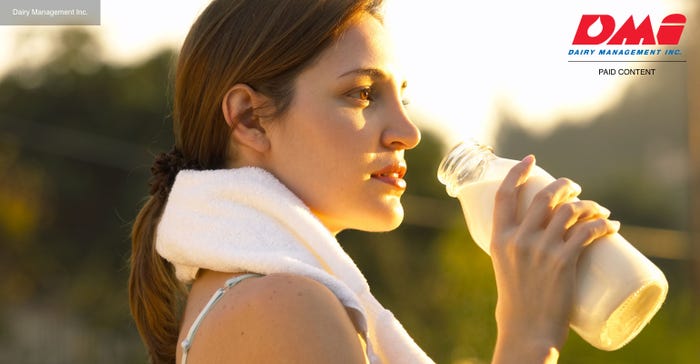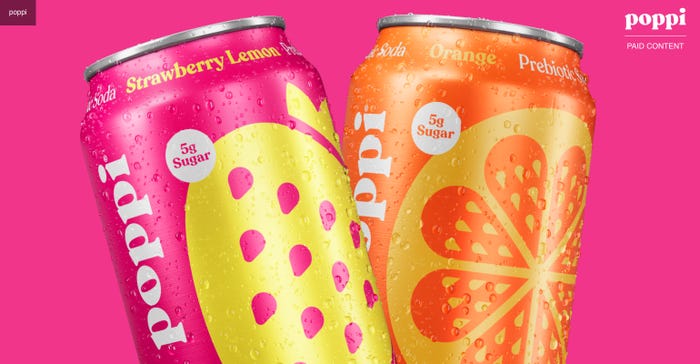Natural hydration trends: What retailers need to know – articleNatural hydration trends: What retailers need to know – article
Gain insight into what drives consumer choice in functional, clean hydration beverages
October 24, 2024

Sponsored by Dairy Management Inc.
In today’s fast-paced world, everyone needs fluid to survive and thrive. In fact, 7 in 10 consumers report that they always carry a drink with them, according to the Hartman Group’s Modern Beverage Culture report. Being hydrated, it turns out, is more than just quenching thirst—it is synonymous with living a healthy lifestyle, and beverages are often used as meal or snack replacements. But what exactly are consumers looking for when they reach for that bottle?
Despite hydration being one of the biggest health and wellness needs, close to 40% of consumers are dissatisfied with what they are consuming today, according to a comprehensive health and wellness study with more than 12,000 U.S. consumers conducted by ZS, a leading global health and wellness consulting firm. Many consumers are still in search of the perfect beverage to meet their hydration needs. Their high level of dissatisfaction is driven by their thirst for more.
Why hydrate and how much is enough?
While we’re told from an early age to hydrate, just how important is it to our health? Very. Water makes up more than half of the weight of the human body and is considered one of the most essential nutrients. Water supports nearly every bodily function, including brain health (cognition, mood and headaches included), digestive health, heart health, weight management, kidney function, skin health, temperature regulation, and more. “Ultimately, it has a huge influence on our health, energy levels and general wellbeing,” says Kerry Hackworth, MS, RD, LDN director, nutrition affairs at National Dairy Council.
When it comes to hydrating, it’s recommended that healthy women should consume approximately 9 cups of beverages per day, according to Hackworth, and healthy men should consume about 13 cups of beverages per day. The recommendations are even higher for those who exercise or have certain medical conditions. While most healthy adults get enough fluid throughout the day between the combination of beverages and foods that contain high water content, older adults, those who exercise and children are at the highest risk for dehydration.
And, of course, the quality of beverages counts. Most Americans could stand to improve the quality of what they are drinking, as nearly 40% of adults drink sugar-sweetened-beverages that push their sugar intake well over the recommended daily limit.
Functional benefits critical to satisfaction
While water, sports drinks and soda are often top of mind when it comes to drinks selected for hydration, according to the Hartman Group report, there are other more satisfying options. In fact, dairy milk might just be your hydration MVP. A good source of high-quality protein, plus electrolytes like potassium and calcium and naturally made up of 90% water, dairy milk serves up more health benefits than most consumers think.
According to the ZS study, consumers will be more satisfied if products would better quench their thirst, provide more sustained hydration, are natural and provide a quick boost of electrolytes to help better replenish their body when they need it. But they’re also seeking even more functional benefits from their hydration drinks, such as immune system support, a boost of energy and even hydration to support healthy skin.
“Consumers may be interested to know that hydration is important for fluid balance and electrolytes are important in the hydration equation, too,” explains Katie Brown, EdD, RDN, president of National Dairy Council. “Electrolytes are minerals, including sodium, potassium, calcium and magnesium, and are integral to things like efficient muscle contraction, supporting heart rate and blood pressure, moving nutrients into cells and maintaining fluid balance.”
In fact, research shows that after a workout, dairy milk can be more hydrating than water. “A study published in 2016 showed that out of 13 beverages tested, only whole milk, skim milk, an oral rehydration solution and orange juice were more hydrating than water,” explains Matt Pikosky, PhD, RD, vice president of nutrition research at National Dairy Council. Because of dairy milk’s unique combination of nutrients, it can provide the perfect combination of fluids and electrolytes that are lost through sweat and prolonged exercise. “Plain water does not rehydrate as quickly because it lacks these important electrolytes,” he adds.
Dairy milk as a nutrient powerhouse
In addition to being one of the most hydrating beverages, dairy milk also is a nutritional powerhouse, providing a good or excellent source of 13 essential nutrients. Here’s a quick look at what an 8-ounce glass of milk provides:
Important nutrients for the immune system, including high-quality protein (15%), vitamins A (15%) and D (15%), zinc (10%), selenium (10%) and B12 (50%).
B-vitamins—riboflavin (30%), pantothenic acid (20%), niacin (15%) and vitamin B12 (50%)—which help convert food into fuel and provide energy to the body’s cells.
Vitamin A that works to help keep skin and eyes healthy.
More bone-beneficial nutrients per calorie than any other food group, including calcium (25%), vitamin D (15%) and protein (15%). High-quality protein in dairy also helps to maintain muscle and bone mass.
With hydration topping the charts as one of the biggest consumer health and wellness need states—and nearly 40% of people feeling let down by their current options—the time is ripe for innovation to meet consumer needs. In consumers’ minds, hydration is as much about meeting and maintaining health needs as it is quenching their thirst.
Read more about:
Sponsored ContentYou May Also Like



